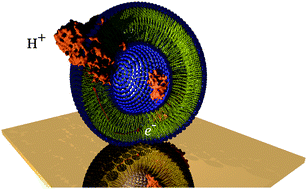UK Scientists have created a hybrid system that uses non-biological energy to drive biological processes. Harnessing non-biological energy to power biological processes offers a convenient method to rapidly turn on and off biochemical reactions and the technology could be useful in many bioengineering applications.
Led by Lars Jeuken researchers at University of Leeds, UK, used a gold electrode to drive the removal of protons from lipid vesicles adsorbed onto the electrode’s surface. The system uses the electrode to reduce ubiquinone in the vesicles. Protons are then pumped across the lipid bilayer and out of the vesicle by an enzyme (ubiquinol oxidase) which re-oxidises the ubiquinone. Actively pumping protons out of the vesicle creates a proton gradient between the vesicle’s interior and the surroundings which the team detected using a fluorescent probe.
The team says that this technology could open a way to use the pH gradient to drive other reactions such as active transport of organic substrates across the membrane or ATP synthesis.
Read the full article for free here:
Don’t forget you can also follow Soft Matter on Twitter to keep up to date with all the latest news!










